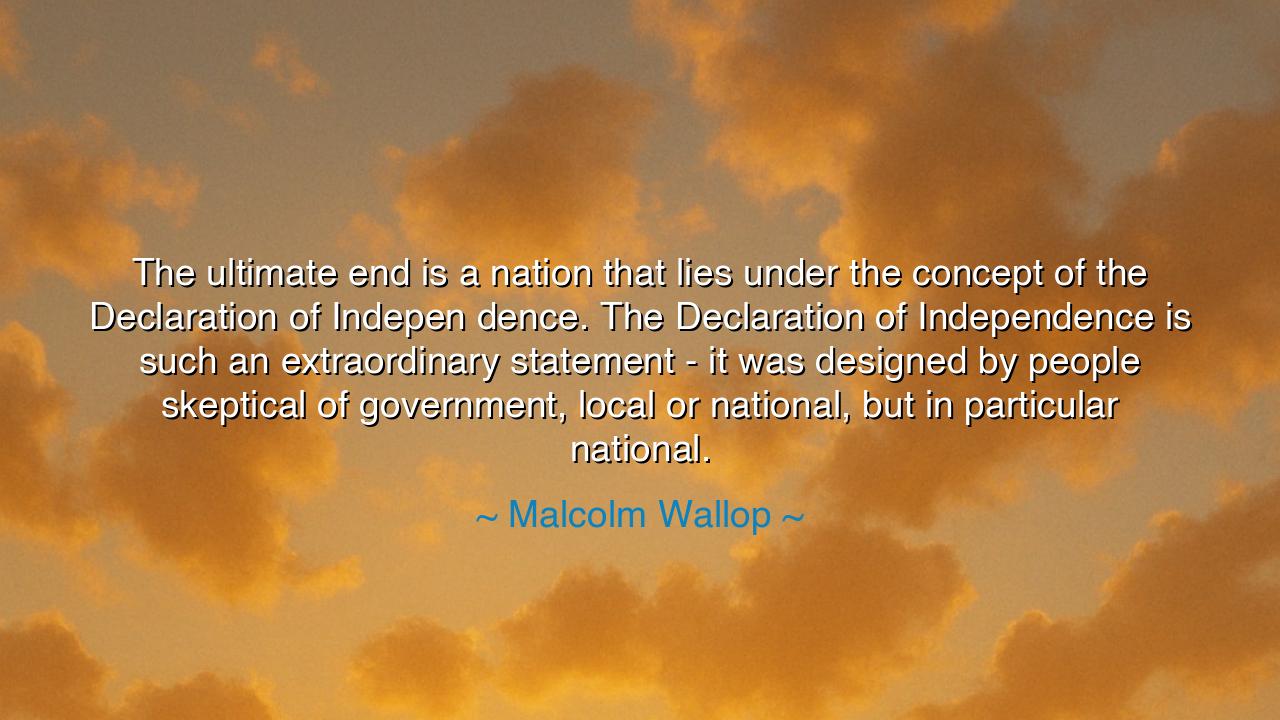
The ultimate end is a nation that lies under the concept of the
The ultimate end is a nation that lies under the concept of the Declaration of Indepen dence. The Declaration of Independence is such an extraordinary statement - it was designed by people skeptical of government, local or national, but in particular national.






“The ultimate end is a nation that lies under the concept of the Declaration of Independence. The Declaration of Independence is such an extraordinary statement—it was designed by people skeptical of government, local or national, but in particular national.” Thus spoke Malcolm Wallop, an American statesman whose words reach back to the very forge of liberty, where the idea of independence was not merely a political design, but a moral covenant. In these lines, he recalls the heart of the American experiment: that government, though necessary, must ever be held in suspicion; that power, though ordained, must ever be watched; and that the true foundation of a nation’s greatness lies not in its rulers, but in the enduring spirit of its free people.
The origin of this quote lies in Wallop’s reflections on the principles that shaped the Founding Fathers. He saw in their work — especially in the Declaration of Independence — not just a proclamation of freedom from British rule, but a vision for how a nation should forever guard its liberty. The Declaration, he reminds us, was not written by dreamers drunk on idealism, but by realists who had known the weight of tyranny. These were men who had tasted the overreach of kings, who had seen how distant governments forget the people they claim to serve. Thus, they built a document infused with skepticism, for they knew that the greatest threat to freedom is not always foreign — sometimes it comes from within.
When Wallop speaks of the “ultimate end,” he calls upon a higher destiny: that the United States must forever live “under” — not above — the principles of the Declaration. This means that the ideals of liberty, equality, and self-rule are not relics to be worshiped in parchment, but living truths to guide the nation’s soul. The founders’ skepticism of government was not cynicism; it was wisdom. They understood that power, once gathered, seeks to grow — and that only a vigilant people, grounded in moral clarity, can restrain it. The Declaration was not a weapon against one tyrant, but a shield for all generations against the rise of any tyranny.
The ancient philosophers knew this same truth. Aristotle warned that even democracy can decay into despotism if citizens forget virtue; Cicero declared that “the health of the Republic depends upon the integrity of its people.” The founders, steeped in these lessons, created a system that trusted not rulers but laws — not decrees but rights that no government could give or take away. Wallop, in his own age, saw how easily nations forget this heritage. He speaks as one crying out to a people growing complacent, reminding them that freedom is not self-sustaining — it must be tended like a flame that dies when left unguarded.
Consider, for a moment, the history of nations that forgot this truth. The Roman Republic, once the beacon of law and liberty, fell when its citizens grew weary of self-rule and allowed power to consolidate in the hands of Caesar. What began as protection became control; what began as government of the people became government over them. So too did the founders of America design their Declaration of Independence as both a birth certificate and a warning — a statement of purpose and a safeguard against the slow erosion of freedom. Wallop’s reverence for this document is not nostalgia, but a recognition that in its words lies the eternal antidote to tyranny.
And yet, Wallop also reminds us of balance. Skepticism of government must not descend into hatred of order. The founders did not reject government — they sought to restrain it, to chain it to the service of the governed. Their vision was not anarchy, but harmony: a society where citizens are free to pursue happiness, but also responsible to protect that freedom for others. To live “under the concept of the Declaration,” as Wallop says, is to live under a higher law — one that commands not only liberty, but virtue, humility, and civic duty.
Let this, then, be the lesson passed down: independence is not a single event in history, but a perpetual condition of the heart. Each generation must renew it, must question power, must ask whether the nation still lives by the principles of its founding. To be skeptical of government is not rebellion; it is the very act of loyalty to liberty. For the citizen who holds authority accountable honors the dream of the founders more than the one who obeys blindly.
And so, O listener, remember this: a nation that forgets its Declaration of Independence becomes a nation that no longer understands itself. Let your freedom be both shield and torch — shield against the encroachment of unchecked power, torch to guide others toward the same light of self-determination. For as Wallop reminds us, the ultimate end is not merely to be free, but to remain worthy of freedom — to live, always, beneath the concept that made a people sovereign and made the spirit of liberty eternal.






AAdministratorAdministrator
Welcome, honored guests. Please leave a comment, we will respond soon